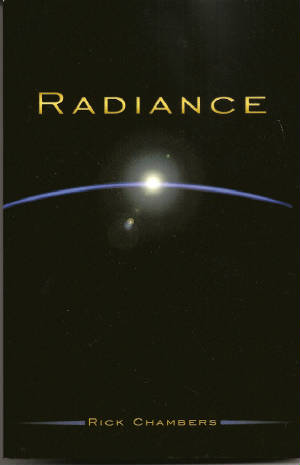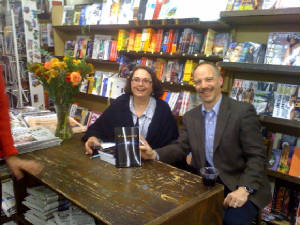|

|
| Author Rick Chambers |
Rick
Chambers is an award-winning writer, communications professional and former journalist. A native of Kalamazoo, Michigan, he is the author of the science fiction novel Radiance,
as well as three novelettes and many published short stories, including several that have won awards. He also wrote two episodes
of the direct-to-video/online series Chronicles.

Zinta
for The Smoking Poet: Welcome once again to our pages, Rick. We’ve enjoyed your short stories in previous issues,
and we’re running a book review on your science fiction novel, Radiance,
in the Zinta Reviews section of this issue. We do want to ask you a few questions about your novel … but we also want to talk to you
about the way that you chose to publish it. First, can you give our readers a synopsis about Radiance?
Rick
Chambers: Thanks, Zinta, it’s great to speak with you. Radiance takes place a century from now, in a time when humanity is losing hope for its future. Eris Lateinos,
the powerful owner of a resort on the Moon, hatches an ambitious plan to restore prosperity to Earth. But Tristan West, his
former PR man, suspects a hidden agenda—and that marks him for death. Into it all step two mysterious strangers who
entangle West in their search for ten people who possess “the Radiance.” Finding those special people is the secret
to uncovering the conspiracy and saving two worlds. Ultimately, Radiance it’s
a story about seeking answers, having faith, and how those things impact our lives.
TSP:
Did you find it difficult to find a publisher for Radiance? If so, why? What kind
of hurdles did you face?
Rick:
I should point out that, being a Christian, I wrote Radiance from a Christian
perspective, though I didn’t necessarily target a Christian audience. I aimed for a tale in the vein of the classic
Space Trilogy books by C.S. Lewis. His faith greatly influenced his fiction, including the Narnia books, but he wasn’t
trying to write Gospel tracts, and neither was I. Like Lewis, I wanted to write a rollicking adventure tale that was both
fun to read and thought-provoking.
So
I pitched the manuscript over many years and got my fair share of rejection letters. I began to suspect that Radiance might be a bit too faith-oriented for secular publishers and a bit too edgy for religious publishers.
Despite some reworking of the story and additional rounds of submissions, the results were the same, I think for the same
reasons. Then I managed to find an agent, but that turned out to be a costly disaster, due in no small part to my naivete.
TSP:
What was the decisive moment for you when you decided to publish Radiance on your
own? What factors came into play?
Rick:
You would think, after my lack of success in pitching Radiance, that I’d
chalk it up as a failed first attempt—certainly not unusual among authors! But in the middle of that pile of rejection
letters were two personal notes that kept me from giving up. The first was from a publisher that nearly bought Radiance, taking it to the last stage of review but finally, reluctantly, going with another author’s work.
In the editor’s very kind letter, he urged me to keep pitching Radiance because
“it deserves to be published.” Later, an editor at another publisher turned down Radiance because it wasn’t the right fit for his catalog, but he took the time to tell me specifically what
was great about the story, stating that it was “eminently publishable.”
Finally, after all the rewrites and rejections and
other disappointments, I thought about those two notes, I looked at the manuscript and said, “I truly believe in this
story. I believe it needs to be published. Maybe it’s time to look at doing it on my own.”

|
| Rick and wife Terri at a book signing, Michigan News Agency, Kalamazoo, Michigan |
TSP:
Once the decision was made, what were your next moves? After all, there are countless ways to publish one’s own book
nowadays, and let’s face it, not all of them are working in a writer’s best interests. Talk to us about your research
process and how you finally made your choice to go with iUniverse?
Rick:
I looked at self-publishing years ago and found it wildly expensive. Back then, the author paid for nearly everything,
and you were pretty much on your own in terms of marketing and selling. Technology has changed much of that. With print-on-demand,
the costs have dropped tremendously. Then there is the availability of online distribution through Amazon, Barnes & Noble
and so on, which exposes your book to a much broader audience. Likewise, the Internet—Web pages, blogs, Facebook and
other social media—is a critical element for marketing. And the best self-publishing houses offer services to help with
editing, proofing, cover design and marketing. Many of those services come at additional cost, of course. But if you’re
serious about putting your best work out there, the resources exist.
What drew me to iUniverse was the experience of
a writer friend of mine, Don Tanner. He wrote a terrific book, No Static At All,
which looks at the changes and social implications of radio and popular music through his years as a DJ. He published two
editions through iUniverse and was quite pleased with the quality, cost and personal touch. I then reached out to iUniverse
with a lot of questions, felt satisfied with the answers, and decided to give it a shot.
TSP:
Would you make the same decision today? Any lessons learned?
Rick:
I’d probably do it again, but I’d do it differently. I think I would utilize more of the marketing resources,
despite the added costs. And I would create a better informed marketing plan of my own. The one I created for Radiance was okay as far as it went, but I understand the challenges better now. Marketing your own book is a
gargantuan commitment of time and energy. You have to go into this with your eyes wide open.
TSP:
Although self-publishing is much more popular today than even just a few years ago, and so, more accepted—it still tends
to carry with it a certain stigma. The stigma is one of poor quality, that a self-published book obviously can’t make
it with those in the literary know. But then, you have someone like Barry Eisler, an author who has spent enviable time on
many bestseller lists with his books, and then decided to walk away from a half million dollar publishing contract, choosing
to go it on his own. Your thoughts on that …
Rick:
To some degree, the stigma is probably deserved. It’s so much easier and affordable to self-publish today—on
the e-book side, you can do it almost for free. There’s not as much of a quality filter anymore. On the flip side, self-publishing
can make a lot more good material available that wouldn’t land with a mainstream publisher because the market isn’t
considered big enough—an increasing challenge as publishing budgets get tighter. Also, it gives the author a lot more
control of the process. I can understand why an accomplished and savvy author like Eisler might make that decision. If you
understand how the system works, and you have the knowledge and resources to publish, market and distribute your work, it’s
a viable alternative. But I doubt many authors have that ability.
TSP:
So you have the book published, ready for sale. Now comes the marketing. You have substantial experience in that field …
Rick:
With a quarter century in public relations, I understand the elements of a good PR and marketing plan. But again, you’ve
got to go into this with your eyes wide open. Mine were probably half open at best. I created a plan, and I did a lot of things
right—news releases, book signings, direct outreach to targeted reviewers around the country, connecting through social
media, and so on. But looking back, I don’t think the plan was nearly as robust as it needed to be. I think a stronger
plan, and more time for me to drive it, would have made a big difference.
TSP:
How important of a role should a writer’s ability and motivation to do the work of marketing play in the decision to
self publish?
Rick:
It’s absolutely critical. It’s the bulk of the experience, in my view. Most people think the hard work is
the writing. I don’t want to downplay the challenge of writing, but the greatest self-published novel on the planet
is just recycling fodder without a smart, ambitious marketing plan driven relentlessly by someone who knows how and has the
resources to do it well.
TSP: Can you share some tricks of the trade? What have you learned about authors readings,
about getting your book placed in brick and mortar book stores as well as online?
Rick:
While online booksellers have been kind to Radiance, and I’m grateful
for that, I’m a huge fan of real book stores. It saddens me how few are left, especially independent ones. So one of
the first things I did was reach out to book stores in Michigan, and I was humbled by the enthusiasm and support of the owners.
They love books, and they love to spotlight authors, especially homegrown ones. Regarding placement, it’s important
to know what distributors your self-publisher works through, and whether they have relationships with the online sellers as
well. Also, it’s far more likely you’ll get more support from an independent bookseller than through a large chain.
I was disappointed by the lack of interest I got from chain outlets in local communities.
TSP:
We’ve talked about some of the disadvantages of going this route. What are some of the advantages?
Rick:
Greater control of what you do with your work. Much faster time to market. Relatively modest cost, depending on how many
services you utilize. And, if you do your homework before choosing a self-publisher, the quality of the book itself is just
as good as anything from a big house.
TSP:
Well, and we can vouch for the quality and literary value of your work, Rick. I’d say don’t judge a book by its
cover, but then, your cover art is pretty neat …
Rick:
Thanks! Again, it was a service that iUniverse provided. I worked directly with a consultant, gave an idea of what I wanted,
and I selected the artwork. Within a week or so, they sent me the concept, and I was blown away. It was exactly what I’d
envisioned. I’ve received a lot of positive comments about the cover design—and, thankfully, about the story!
TSP:
All said and done, are you working on anything new now? And if you are, will you self publish?
Rick:
I have a manuscript done on a second novel, and I’ve been through three or four rewrites on it, but I haven’t
decided if it’s strong enough to move forward. I have another that started as a screenplay for an independent filmmaker;
it’s in rough draft now. But what I’m really leaning toward is a collection of my short stories. A few of them
have won awards over the years, and I’d like to compile them. I would certainly consider self-publishing if it made
sense.
TSP:
Any thoughts on the book publishing going increasingly more electronic? Do you own an e-reader? We’re curious, since
you like to look into the future, how you see the future of publishing, of literature and how we will be reading our books
in the future …
Rick:
It’s funny you would mention e-readers, because they show up briefly in Radiance,
and I let my opinion of that trend sort of peek out. I do own an e-reader, and I use it a lot, especially when traveling.
But in my view, e-readers will never replace “real” books. Yes, eventually, e-readers will dominate—very
nearly do already, in fact. But I think, at least for a long time, people are going to want to hold a real book, to smell
real ink, to feel their fingers brush across real pages. Printed books make you feel more connected to the story somehow,
versus the clinical “click-click” of a button or swipe of a finger on an e-reader. An odd sentiment, I suppose,
coming from a science fiction writer!
TSP: Thank you, Rick. All the best to you, with Radiance,
and with your future writing projects! We’ll be reading you.
|

